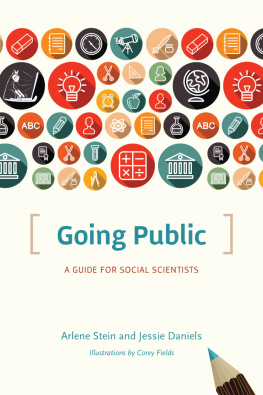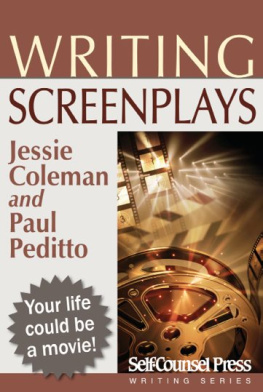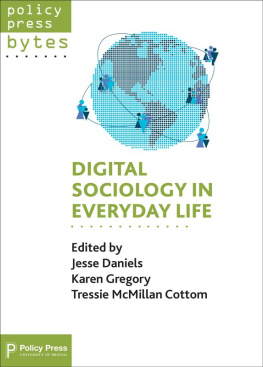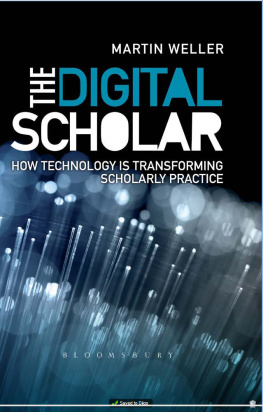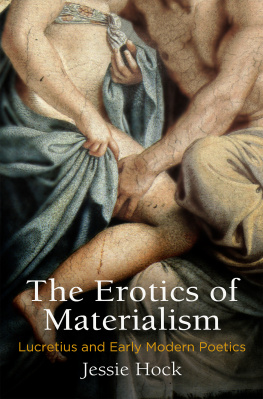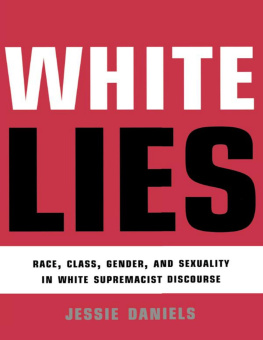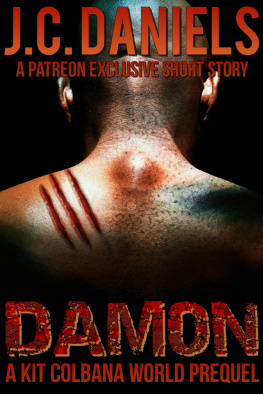BEING A SCHOLAR IN
THE DIGITAL ERA
Transforming scholarly practice
for the public good
Jessie Daniels
Polly Thistlethwaite
First published in Great Britain in 2016 by
Policy Press University of Bristol 1-9 Old Park Hill Bristol BS2 8BB UK Tel +44 (0)117 954 5940 e-mail
North American office: Policy Press c/o The University of Chicago Press 1427 East 60th Street Chicago, IL 60637, USA t: +1 773 702 7700 f: +1 773-702-9756 e:
Policy Press 2016
British Library Cataloguing in Publication Data
A catalogue record for this book is available from the British Library.
Library of Congress Cataloging-in-Publication Data
A catalog record for this book has been requested.
ISBN 978-1-4473-2926-8 paperback
ISBN 978-1-4473-2925-1 hardcover
ISBN 978-1-4473-2927-5 ePub
ISBN 978-1-4473-2928-2 Mobi
The right of Jessie Daniels and Polly Thistlethwaite to be identified as authors of this work has been asserted by them in accordance with the 1988 Copyright, Designs and Patents Act.
All rights reserved: no part of this publication may be reproduced, stored in a retrieval system, or transmitted in any form or by any means, electronic, mechanical, photocopying, recording, or otherwise without the prior permission of Policy Press.
The statements and opinions contained within this publication are solely those of the authors and not of The University of Bristol or Policy Press. The University of Bristol and Policy Press disclaim responsibility for any injury to persons or property resulting from any material published in this publication.
Policy Press works to counter discrimination on grounds of gender, race, disability, age and sexuality.
Cover design by Soapbox Design
Front cover: image kindly supplied by istock
Readers Guide
This book has been optimised for PDA.
Tables may have been presented to accommodate this devices limitations.
Image presentation is limited by this devices limitations.
Contents
About the authors
Jessie Daniels is Professor of Sociology & Critical Social Psychology at Hunter College and the Graduate Center, CUNY. She has published five books, including Cyber racism (Rowman & Littlefield, 2009), along with dozens of articles. Jessie blogs at Racism Review and can be found on Twitter @JessieNYC.
Polly Thistlethwaite is Professor and Chief Librarian at the Graduate Center, CUNY, where she has worked since 2002. Prior to that she worked at Colorado State University, Hunter College, New York University, Yale, and the University of Illinois. Her activism with ACT UP New York during the early days of the AIDS epidemic primed her for present-day advocacy for public scholarship and open access publishing.
Acknowledgements
It may be unexceptional to note that a book is manifest by a collective effort, but the collaborations behind this work are extraordinary and plentiful.
We begin by thanking Victoria Pittman at Policy Press who suggested that the project should become a book. Then she offered invaluable direction and encouragement throughout the writing and editing process. She and many others at Policy Press, including Alison Shaw and Rebecca Tomlinson, were gracious and accommodating in their willingness to work with us to forge an innovative publishing contract that included significant author partnership in determining the format and distribution of this work. In a book that is very critical of academic publishing, Policy Press is one example of getting it right.
In part, this book is about the JustPublics@365 project, which emerged out of an initial conversation that included Juan Battle, Stephen Brier, Michael Fabricant, Michelle Fine, Ruth Wilson Gilmore, Janet Gornick, Deborah Tolman, and about twenty or so other faculty, brought together by Don Robotham under the Advanced Research Collaborative at the Graduate Center, City University of New York (CUNY). Don brought us all together to discuss how we might collaborate on interdisciplinary research on inequality, and in a flash of insight, he slammed his hand on the table for emphasis and declared: and, we have the Internet we could use that to collaborate!
Jessie Daniels took his declaration as a provocation and volunteered to write a short concept paper about what a project might look like that was collaborative, interdisciplinary, focused on equality, and using the Internet. From there, Michelle Fine and Deborah Tolman read and edited multiple drafts until they midwifed that document into something more like a fully formed grant proposal. Chase Robinson (then Provost of the Graduate Center) took an interest and invited Matthew K. Gold, an expert in digital humanities, to join the project. Gold, Robinson, and Daniels reworked the proposal over several weeks. And Robinson and William P. Kelly (then President of the Graduate Center) took the proposal to the funder. We are grateful to all of these wonderful colleagues for the shared experiences in developing the project on paper.
We were extraordinarily fortunate to have garnered the support of the Ford Foundation, which made it possible to take this experiment from conjecture to reality. We are especially grateful to Douglas E. Wood, our program officer at the Ford Foundation, for understanding the project early on, for guiding us through a time of tremendous change at that foundation, for stewarding financial support for the project, and for keeping the notion alive that social justice projects in higher education are not only possible, but crucial.
We launched JustPublics@365 with the help of a legion of wonderful colleagues and staff. Jen Jack Gieseking, Morgane Richardson, Wilneida Negrn, Brownyn Dobchuk-Land, and Colette Sosnowy offered their insights about the connections between digital technologies, scholarly communication and activism in ways that made the project so much better than we had originally imagined it. Emily Sherwood made every document that left our office look shiny and beautiful. Heidi Knoblauch led all our efforts at podcasting and managed MediaCamp. Stephanie M. Anderson and Amanda Matles created beautiful video recordings of our events. John Boy, Karen Gregory, and Fiona Lee offered creative and practical work on educational technology. All of these people did this challenging, often accelerated, work at the same time they were finishing their PhDs, launching their own careers and managing precarity. They are, each one, remarkable.
The JustPublics@365 project would likely not have happened at the Graduate Center if it were not for Matthew K. Gold. He guided the early stages of the project and helped maneuver it through the sometimes impenetrable institutional bureaucracy. His background in digital humanities informed much of the work we developed here, and we extend to him our deepest gratitude.
One of the key points we make in this book is that digital technologies open up new possibilities for collaborations between academics and journalists. This was a theory when we began, but our collaboration with the CUNY Graduate School of Journalism taught us more fully what is possible if academics and journalists work together. We want to thank our colleagues in journalism: Judith Watson, Amy Dunkin, Deb Stead, Susan Farkas, Frederick Kaufman, Amanda Hickman, and Jere Hester. We owe a special thanks to Sandeep Junnarkar, who did tremendous work to make the MediaCamp workshops a success. Tanya Domi, the Graduate Centers Director of Media Relations, guided the op-ed workshop in MediaCamps last iteration.



